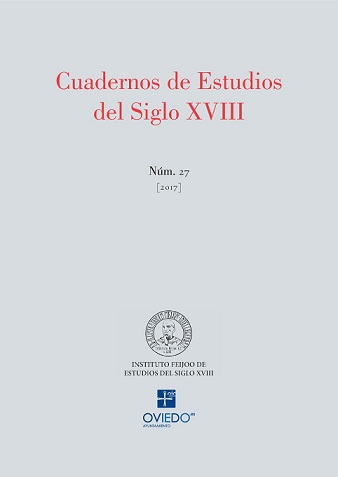Abstract
RESUMEN
Benito Jerónimo Feijoo, intelectual, erudito y ensayista de la Ilustración española durante la primera mitad del siglo XVIII, realizó una gran aportación en el campo de la ciencia geológica de los temas más controvertidos del momento a través de un análisis reflexivo y de su divulgación. Abarcó el origen de la Tierra bajo la autoridad de las Sagradas Escrituras frente a los torbellinos cartesianos; intuyó que el geomagnetismo procedía de la zona central del planeta; consideraba que los fósiles eran de naturaleza orgánica, negando al mismo tiempo la existencia de los gigantes; los terremotos y los volcanes se debían a fenómenos físico-químicos y eléctricos; defendía la existencia de las montañas antes del Diluvio y su lenta formación mediante el espíritu lapidífico; y era partidario de que los puentes intercontinentales habían sido el mecanismo para el poblamiento de América y la dispersión de los seres vivos. A pesar del enfoque racional en sus discusiones, siempre estuvo sujeto al dogma católico, y consideraba compatibles ambos puntos de vista. Sus fuentes de documentación fueron principalmente obras francesas y de otros autores escritas en latín.
PALABRAS CLAVE
Feijoo, fósiles, montañas, terremotos, volcanes, geomagnetismo, puentes intercontinentales.
TITLE
Scientific foundations of the geological thought of Benito Jerónimo Feijoo
ABSTRACT
Benito Jerónimo Feijoo, an intellectual, polymath, and essayist of the Spanish Enlightenment during the first half of the 18th Century, made a major contribution in the field of geological science of the most controversial issues of his time by means of a thoughtful analysis and its spreading. He covered the origin of the Earth under the authority of Holy Scripture against the Cartesian vortices; was convinced that the geomagnetism came from the central zone of the planet; believed that fossils were organic in nature, denying at the same time the existence of the giant humans; earthquakes and volcanoes were due to physical-chemical and electrical phenomena; supported the existence of the mountains before the Flood and its slow formation as a result of the lapidific spirit; and was an advocate of the land bridges as a mechanism for both the human settlement of America and the dispersion of living beings. Despite the rational approach in his discussions, he was always subject to Catholic dogma, considering both as compatible points of view at all. Feijoo’s sources of documentation were mainly French authors and other sources written in Latin.
KEY WORDS
Feijoo, fossils, mountains, earthquakes, volcanoes, geomagnetism, land bridges.

